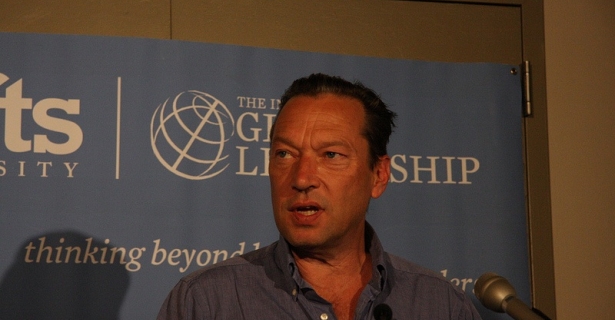By IGL Staffmember Jeremy Zelinger
The 2013-2014 EPIIC colloquium on the future of the Middle East and North Africa opened on Tuesday with a lecture by Scott Anderson, author of Lawrence in Arabia: War, Deceit, Imperial Folly and the Making of the Modern Middle East, which has been a top-ten New York Times bestseller for four consecutive weeks.
To write the book, Anderson spent four years researching T.E. Lawrence and three other characters of the early-twentieth Middle East: Curt Pfufer, a German spy for the Ottomans, Aaron Aaronsohn, a Zionist spy for the British, and William Yale, an American agent of Standard Oil. Anderson, a veteran war correspondent, weaves these character's narratives into a single account of this critical time in the history of the Middle East.
“I love the idea that so much of the history is put into effect by people without titles, without positions who by force of personality and will gave themselves a role on this stage where dramatic things were happening. It wasn’t generals or kings, it was guys in there twenties and thirties,” Anderson explained.
Sherman Teichman, the director of the IGL, introduced Anderson’s lecture. “When I had a chance to read Lawrence in Arabia, I reconnected with Scott. As we reminisced this afternoon, its been a relationship of twenty-five years.” “Its been a delight over the decades to watch the evolution of his work.”
Anderson began his lecture, which was filmed by CSPAN, by providing the historical context for the colonization of the Middle East. World War One introduced mechanized warfare, which wreaked havoc on European armies. Yet rather than withdraw from the geopolitical competition that caused the war, European leaders escalated their imperial demands. This compelled them toward the Middle East, where a weak Ottoman Empire no longer protected the last major area of the world yet to be colonized by Europe.
The peoples of the Middle East, most of which are not Turkic, had been growing increasingly frustrated with their Ottoman rulers who had introduced an ethnic dimension to the empire by dispatching Turkish governors to rule over each region. One of the most powerful Arabs of the empire, Emir Hussein of Hejaz, sent one of his sons, Faisal, to Cairo where he met with the British Governor General and asked what the British would do if the Arabs revolted against the Ottoman empire. The British had no interest in an alliance with the Arabs at the time, but when war broke out in Europe and the Ottomans allied with Germany, the British quickly contacted Emir Huessin to negotiate an alliance to bring down the Ottoman Empire.
The negotiations culminated in the McMahon-Huessin correspondence, in which the British recognized Arab independence in exchange for an Arab promise to revolt against the Ottomans. They promised nearly the entire Middle East to the Arabs, but did so without consulting their allies - France and Russia. After the war, the French demanded territorial compensation for their role in fighting the war. Thus, the British and French signed their own agreement to split the Middle East between themselves, directly contradicting the promises made to the Arabs. The British, however, never told the Arabs about their deal with the French nor did they tell the French about their deal with Arabs.
“The man who brought this to an end was T.E. Lawrence,” Anderson said. “He told Faisal about the British plan to carve out the Middle East with France. He basically committed treason.”
Lawrence was an Oxford educated archeologist who had done extensive fieldwork in Syria, where he became fascinated with Arab culture. When the war broke out, he was sent to Cairo to work as an intelligence officer. In the summer of 1916, when the Arab revolt started, Lawrence accompanied a British officer to Jeddah and managed to make himself the key liaison between the British and the Arab armies.
Lawrence attached himself to Faisal and for the next year and half, led the Arab armies into battle against Ottoman forces. Lawrence succeeded in leading them across Arabia through the port of Aqaba and up to Damascus. But when he got there, General Allenby, who had led British troops into Palestine, informed Lawrence that all of Syria would be going to the French.
“He had spent two years using Damascus as a battle cry for the Arabs. He had talked about how Syria was his new home, how he was happier in Syria than anywhere else. But the day after meeting with Allenby, he left Damascus in a British army car and never came back.”


Add new comment